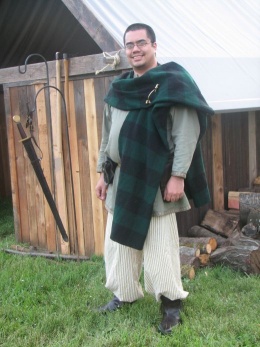Difference between revisions of "Taðkr ormstunga"
(→[[Persona]]: certainly you didn't live for a millenium...) |
m (Edited the image caption to reflect the new image) |
||
| Line 1: | Line 1: | ||
| − | [[Image:Tadkr_ormstunga.jpg|thumb|260px|Taðkr ormstunga | + | [[Image:Tadkr_ormstunga.jpg|thumb|260px|Taðkr ormstunga at The Grand Thing VII.]] |
== Summary == | == Summary == | ||
Revision as of 01:46, 12 January 2013
Summary
Originally Tadhg the Thinker, Taðkr began participating in the SCA during the summer of 2000 as a guest of Jarni Auga Sigurdson. In 2001 he became man-at-arms to Jarni's father, Sigurd the Dark, and became a permanent member of the House of Hormones. When the House of Hormones joined the Village of Bjorgvin in 2002, a series of events surrounding his oath swearing resulted in him being inadvertently named "Loki" by then Konungr Finnr Skeggison. As a result, Taðkr is known in the Village of Bjorgvin simply as "Loki" to this day.
By the time he registered his name in 2006, his persona had developed a strong Norse slant; so he opted for the Norse spelling of "Taðkr" and adopted the byname ormstunga, meaning "serpent's tongue." In 2007, alongside Senen meśou-nešed, Toomachi no Shichiro, and Anejiro no Tamiko, he formed a new household styled after settlement-era Iceland, becoming goði of House Jormungandr.
Persona
Tadc MacBeccáin, son of Beccán Riabaig, was born in the Kingdom of Osraighibh in Ireland in the year 908. In 919 his father joined Niall Glundub, the Cenél nEógain king of Tara, in the Battle of Dublin against the northmen and was killed. Being very near the invasion, Tadc and his family were put into bondage by the northmen and became thralls to the Vikings. Tadc spent many years resigned to a slave's life before he was separated from his kin and given as a gift to a Viking landsmenn named Sigurðr inn Svarti, whom returned with Tadc to Sweden. The northmen, unused to Tadc's then quiet demeanor, began calling him Tadc the Thinker.
Tadc spent some years serving Sigurð's house, until a time when Sigurðr found himself in need of oarsmen on his ship. Having found Tadc to be a fast learner around his hall, Sigurðr decided to place him on his ship in spite of his ignoble status. As a ship hand and eventually drengr to Sigurðr inn Svarti, Tadc was able to learn much about ships and even more about fighting while on countless viking raids. He learned above all that there was glory to be won in justly taking spoils from a vanquished foe, and quickly adopted the Norse outlooks on raiding and death. On long voyages he fashioned songs and told great stories, and was called skáld. It was in 925, after becoming something of a mentor to Tadc, that Sigurðr freed him and called him leisingr. Tadc swore himself to Sigurðr's hearth, becoming a retainer to his house. The two became closer over time, and would continue to raid for only a few more seasons before Sigurðr began thinking about settling down. At this time another warrior, the Jarl of a Norwegian hill pasture, heard of Sigurðr's exploits and word-fame, summoning him with an offer to join his hall. Having heard of the Jarl's strength and generosity, Sigurðr accepted and became an important man in the Jarl's hall. At the swearing of oaths, Tadc recounted past glories with such fervor that he was given a new name by the Norwegians: Tungu-Taðkr.
Several years passed, and by 928 Taðkr began to yearn for more raids, as well as his own glory, fame, and riches. He asked for Sigurðr's permission and blessing to seek his own adventure on the seas, and was seen off with gifts of a sword, a mail shirt, and a ship. Taðkr found and recruited his own drengr to man the ship, and over time found himself with a diverse crew of Irish, Norse, and Saxon warriors. Following their first raiding season, Taðkr wished to find new land to settle as their own and happened upon Iceland. His crew quickly established a territory, attracting more followers in the years that followed as Taðkr's reputation made him goði. He now represents the people of his hall in matters political, and heads a house of tradesmen, mercenaries, and vikings.
